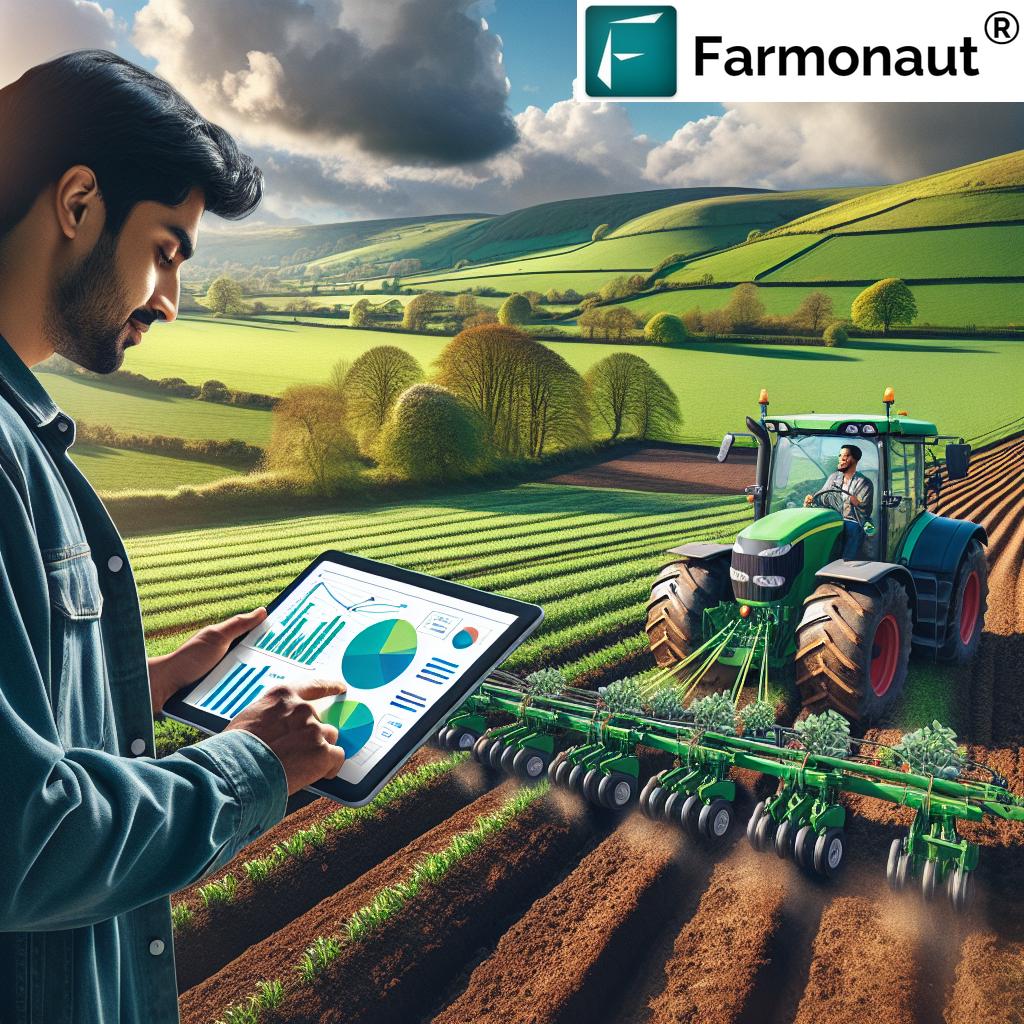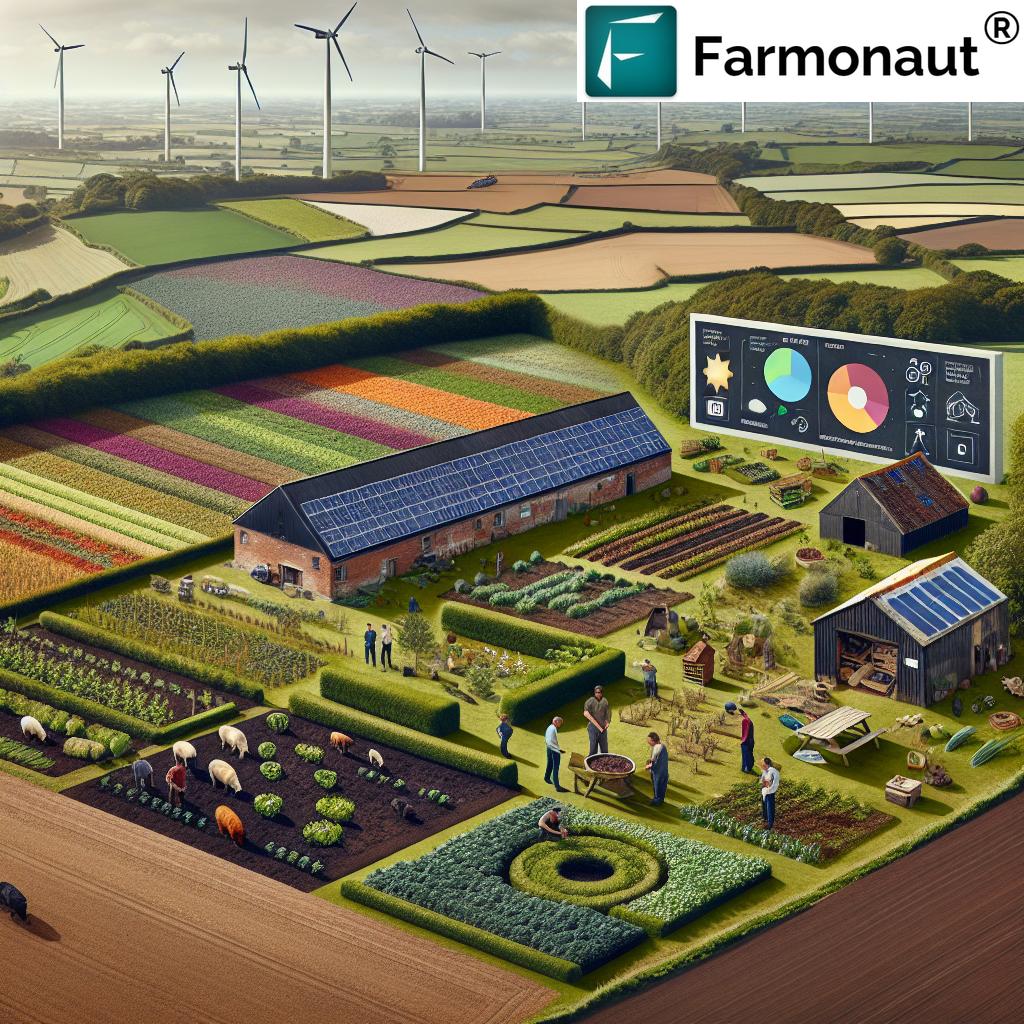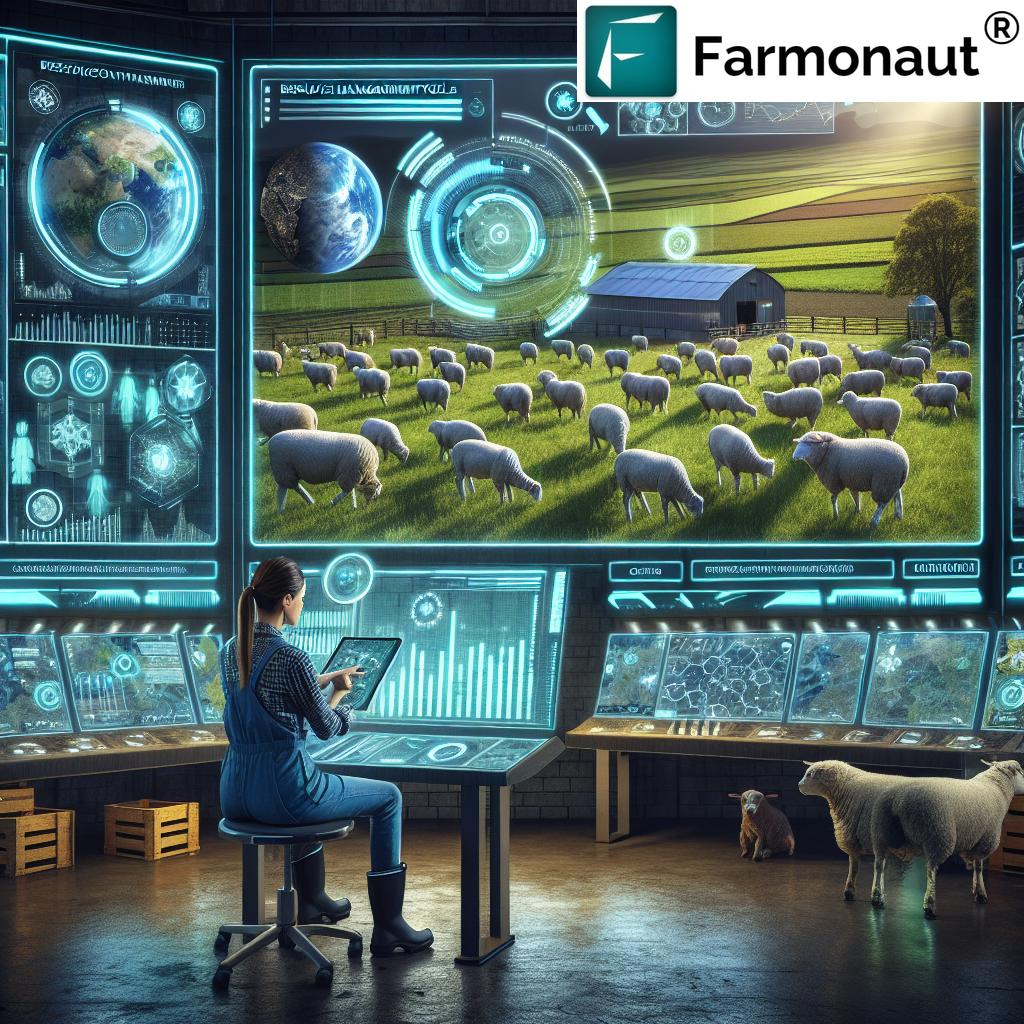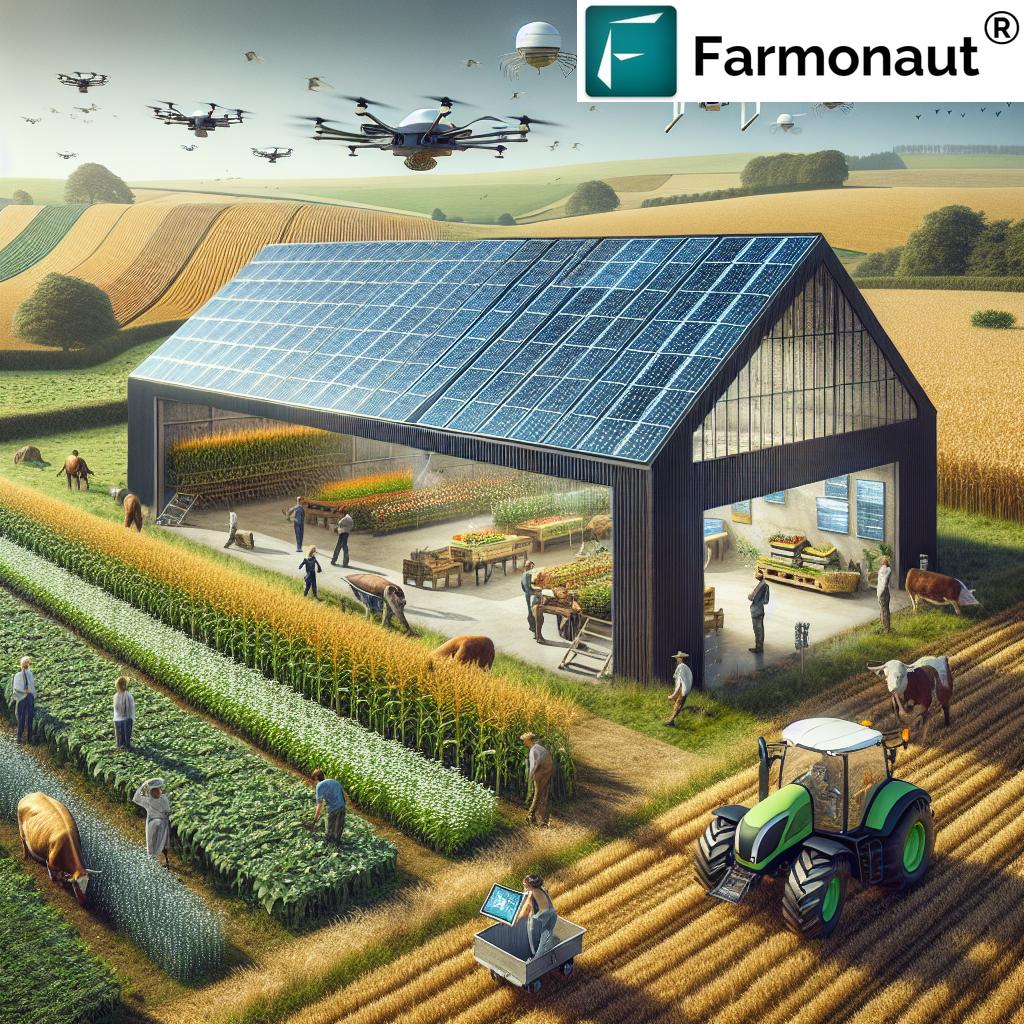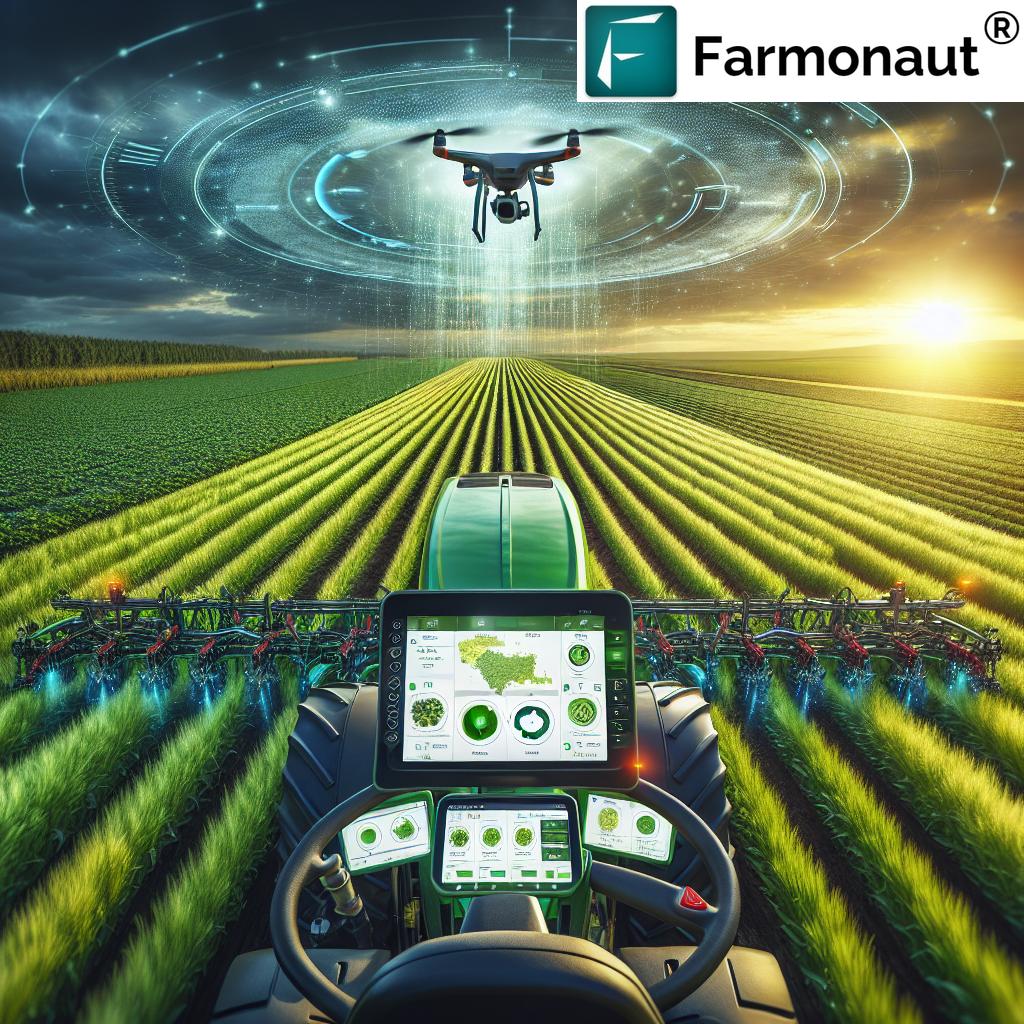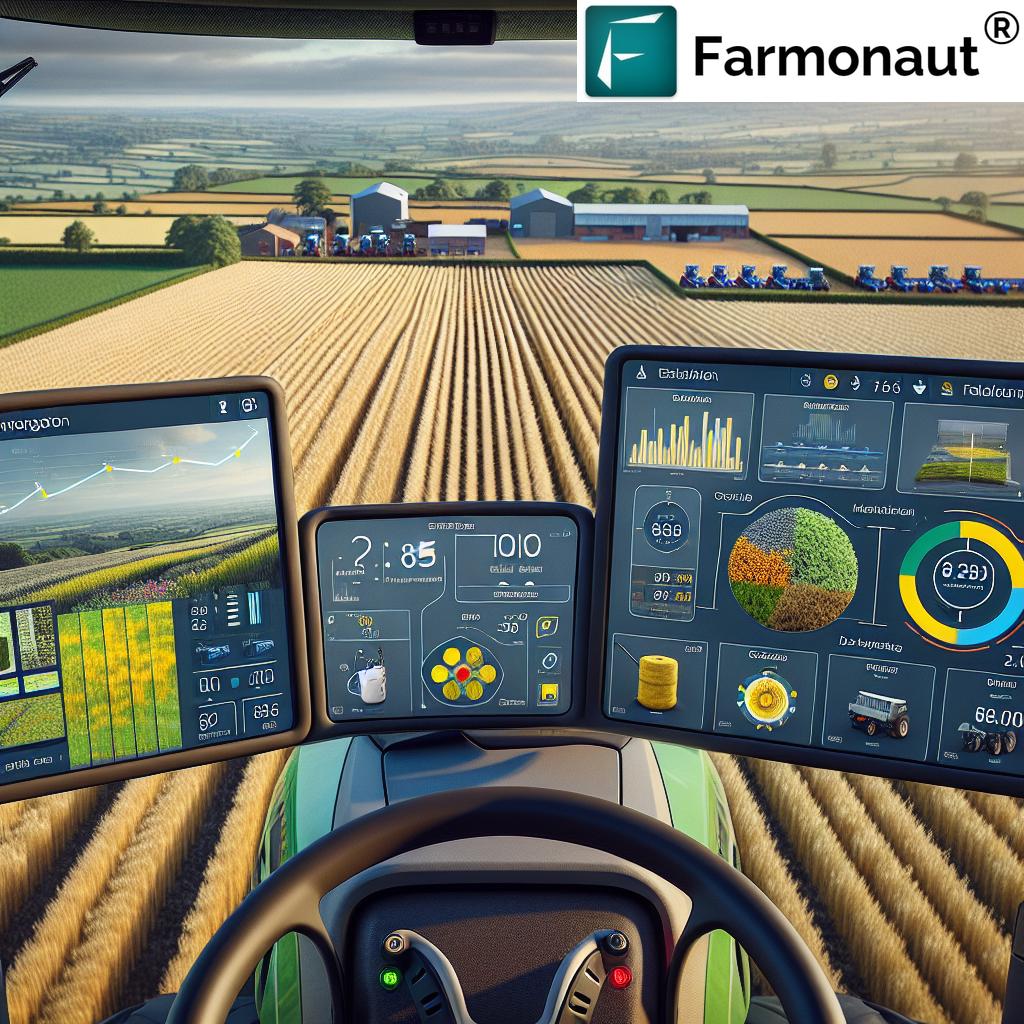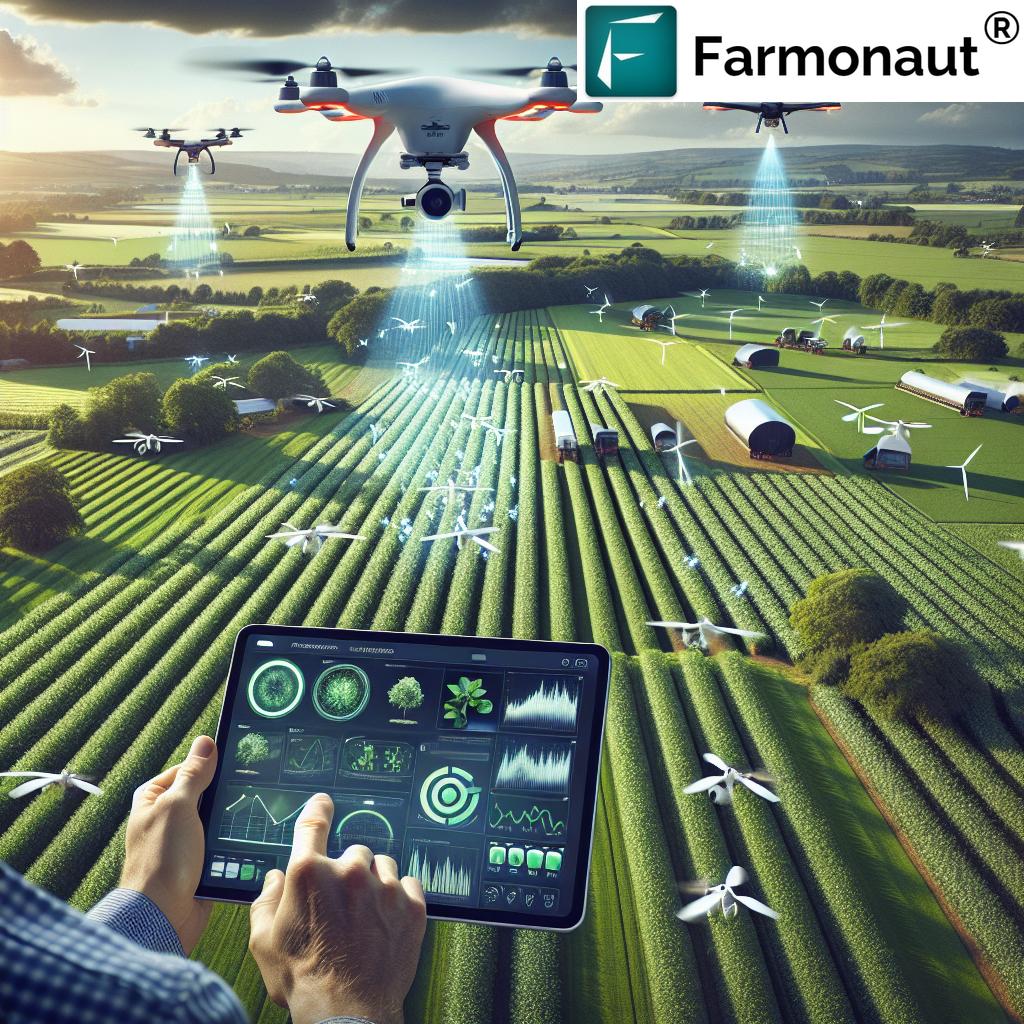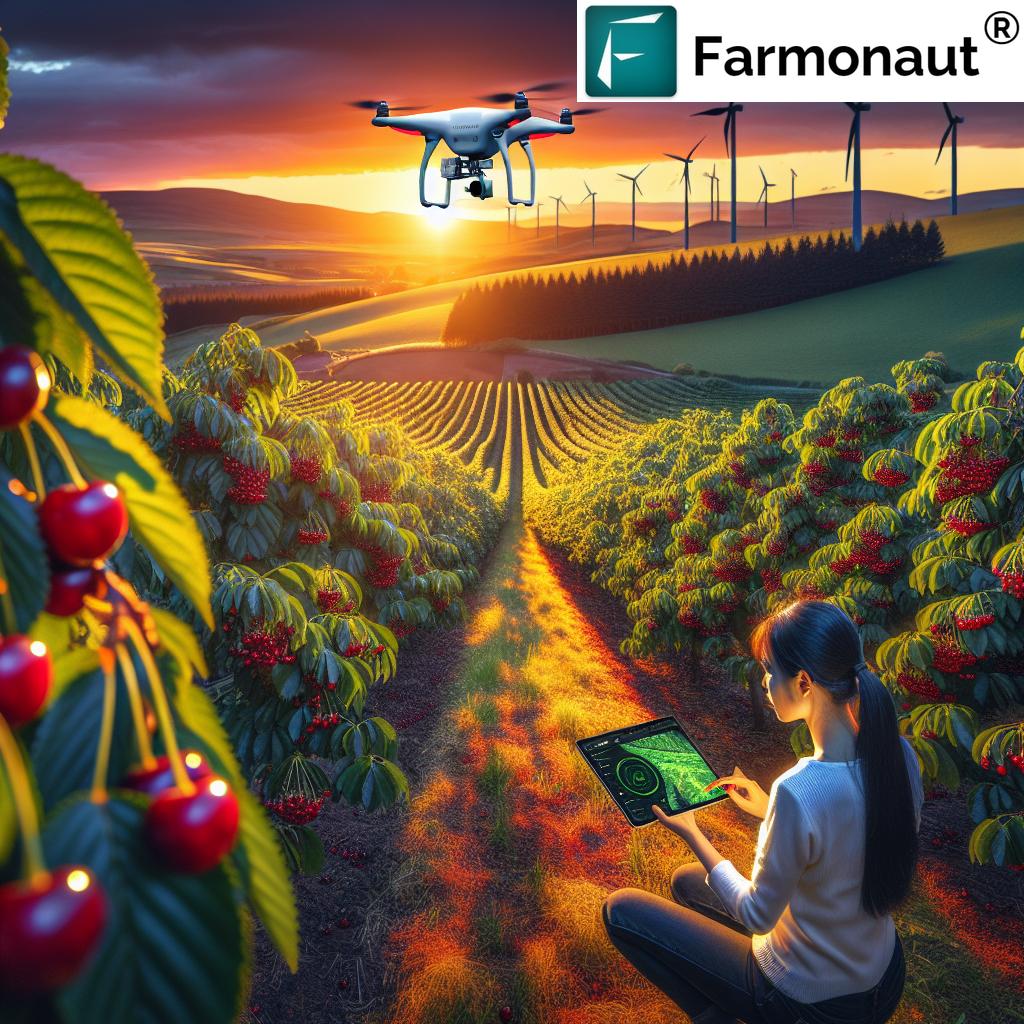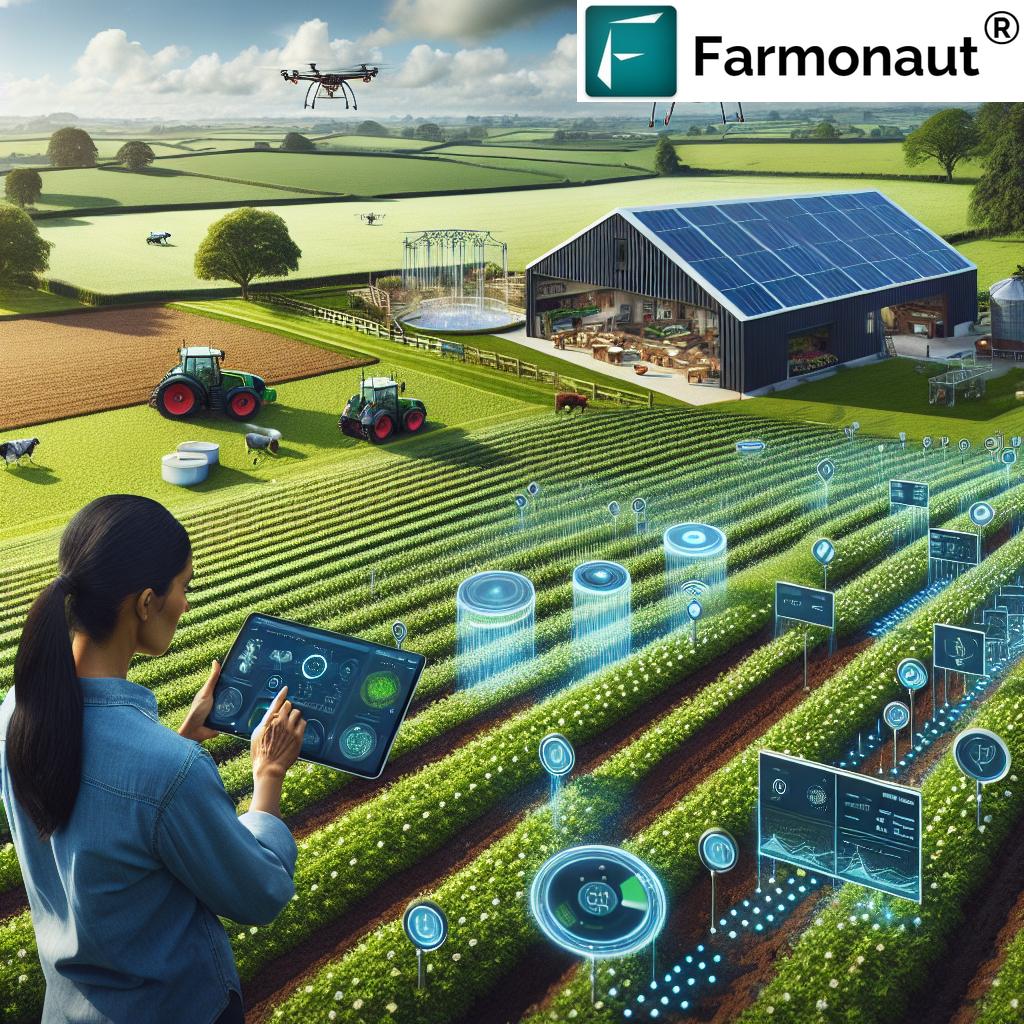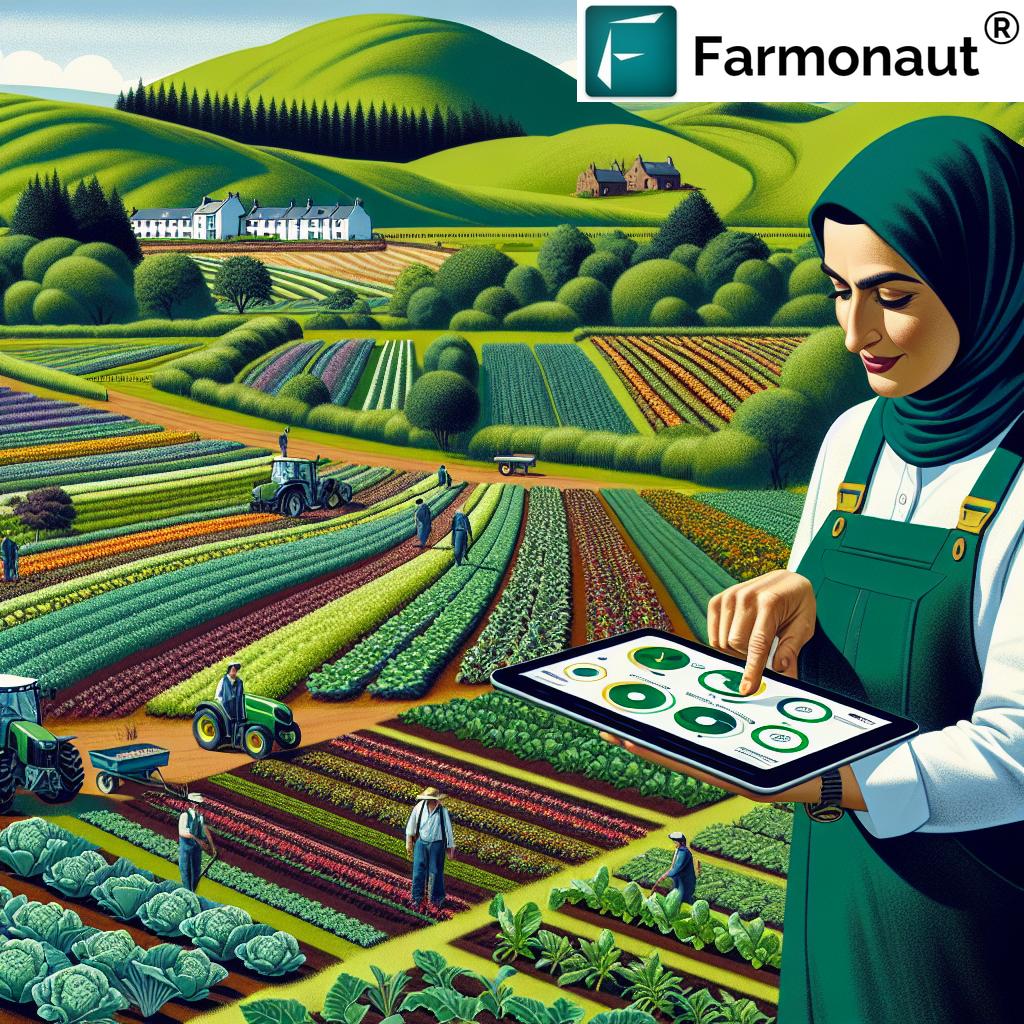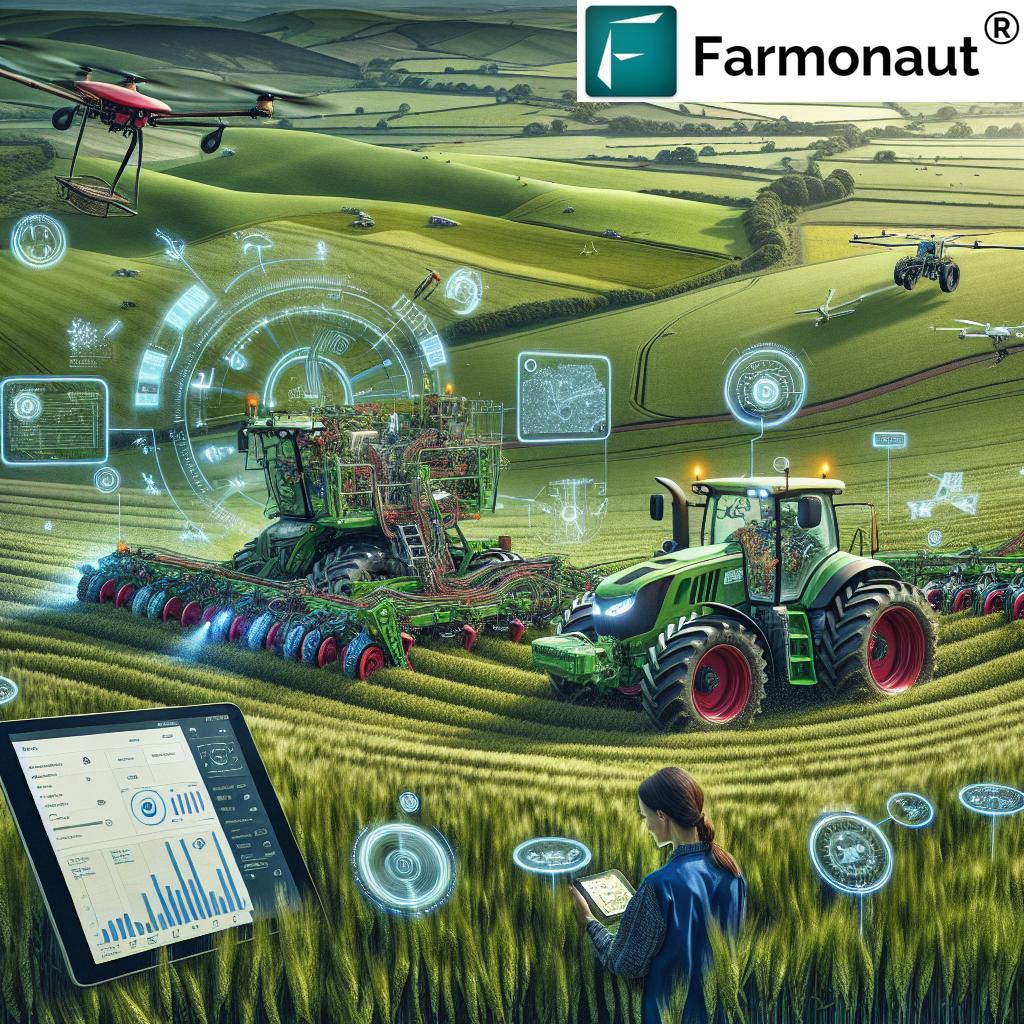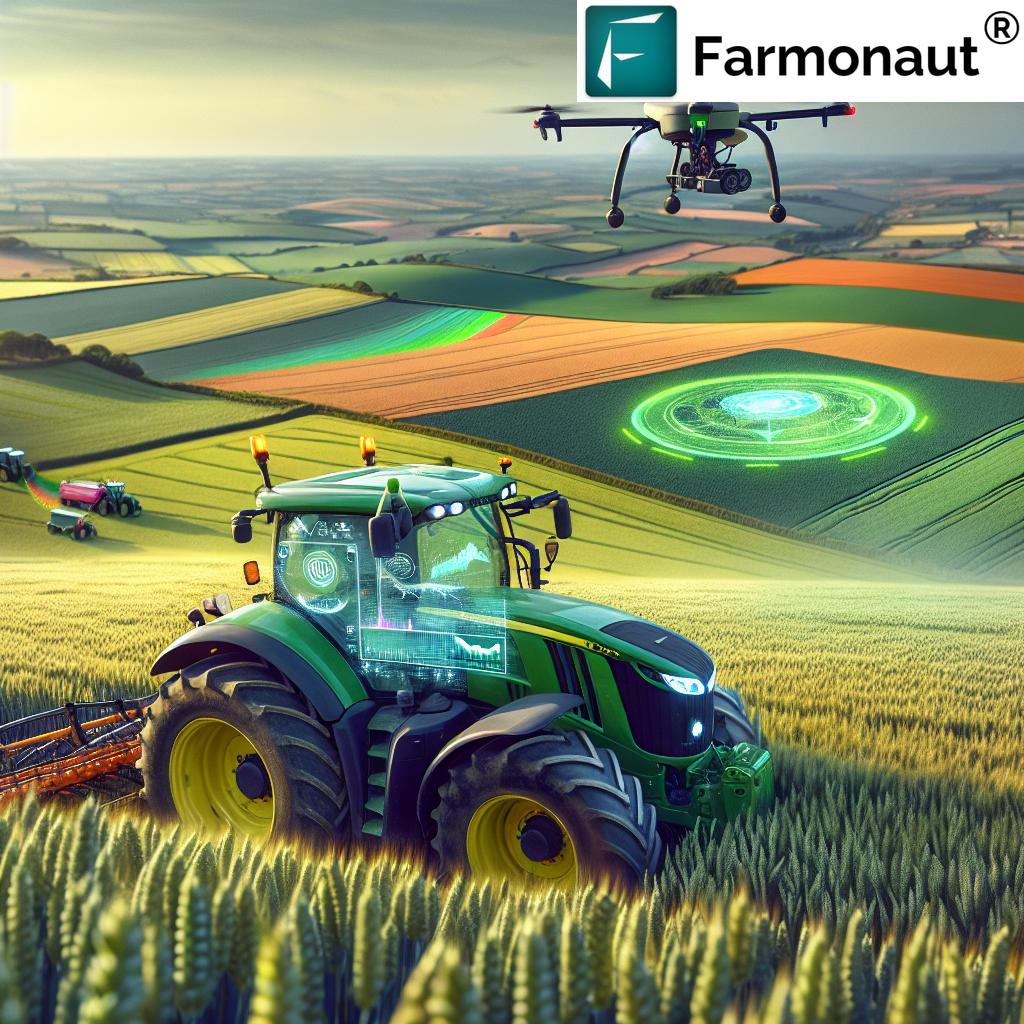Revolutionizing UK Farming: Farmonaut’s Sustainable Solutions for Net Zero Agriculture and Carbon Footprint Reduction
“A groundbreaking UK trial involving 200 farms is showcasing various engagement options for sustainable agriculture and carbon footprint reduction.”
In the heart of the United Kingdom’s agricultural landscape, a revolution is underway. As we navigate the challenges of climate change and environmental sustainability, the farming sector is at the forefront of innovation, embracing new technologies and practices to pave the way for a greener future. At Farmonaut, we’re proud to be part of this transformative journey, offering cutting-edge solutions that empower farmers to reduce their carbon footprint and transition towards net zero agriculture.
Our mission is clear: to make precision agriculture accessible and affordable for farmers across the UK and beyond. Through our advanced satellite-based farm management solutions, we’re helping to reshape the face of British farming, one field at a time. But before we delve into the specifics of our innovative approach, let’s explore the broader context of sustainable farming practices and the urgent need for agricultural greenhouse gas reduction in the UK.
The Imperative of Sustainable Farming Practices
Sustainable farming practices are no longer just an option; they’re a necessity. As stewards of the land, farmers play a crucial role in mitigating climate change and preserving our natural resources for future generations. The UK’s agricultural sector is rising to this challenge, implementing a range of eco-friendly strategies that not only reduce environmental impact but also enhance farm productivity and resilience.
Key sustainable farming practices include:
- Precision agriculture techniques
- Regenerative farming methods
- Agroforestry and silvopasture systems
- Organic farming practices
- Conservation tillage
- Crop rotation and diversification
- Integrated pest management
These practices not only contribute to agricultural greenhouse gas reduction but also improve soil health, water retention, and biodiversity on farms. At Farmonaut, we provide the tools and insights necessary for farmers to implement these practices effectively, leveraging satellite technology and AI-driven analytics to optimize resource use and minimize environmental impact.
The Role of Environmental Land Management Schemes
Environmental land management schemes play a pivotal role in the UK’s transition to more sustainable farming practices. These initiatives, supported by the government and agricultural organizations, provide financial incentives and guidance for farmers who adopt eco-friendly methods. Some key schemes include:
- The Environmental Land Management Scheme (ELMS)
- Countryside Stewardship
- The Sustainable Farming Incentive
- Local Nature Recovery
- Landscape Recovery
These schemes not only support farmers in their sustainability efforts but also contribute to broader environmental goals such as improving air and water quality, enhancing biodiversity, and mitigating climate change. Farmonaut’s platform integrates seamlessly with these initiatives, providing farmers with the data and insights they need to participate effectively and maximize the benefits of these programs.
Measuring and Reducing Carbon Footprint for Farms
One of the most critical aspects of sustainable farming is understanding and reducing the carbon footprint of agricultural operations. Accurate measurement is the first step towards effective reduction strategies. This is where Farmonaut’s advanced technologies come into play, offering precise tools for carbon footprinting and benchmarking.
Our satellite-based monitoring system provides real-time data on various factors that contribute to a farm’s carbon emissions, including:
- Soil carbon levels
- Crop health and biomass
- Energy use in farm operations
- Livestock management practices
By analyzing this data, farmers can identify areas for improvement and implement targeted strategies to reduce their carbon footprint. Our AI-powered advisory system, Jeevn AI, goes a step further by providing personalized recommendations for carbon reduction based on each farm’s unique characteristics and operations.
The Path to Net Zero Agriculture
The concept of net zero agriculture is gaining momentum in the UK, with farmers and policymakers alike recognizing its importance in combating climate change. Net zero agriculture aims to balance the greenhouse gases emitted by farming activities with an equivalent amount removed from the atmosphere.
Achieving this goal requires a multi-faceted approach, including:
- Reducing direct emissions from farming operations
- Enhancing carbon sequestration in soils and vegetation
- Adopting renewable energy sources
- Improving resource efficiency
- Implementing circular economy principles in farm management
Farmonaut’s comprehensive farm management solutions support farmers in each of these areas, providing the tools and insights necessary to transition towards net zero agriculture. Our platform enables farmers to track their progress, set realistic goals, and make data-driven decisions to reduce their environmental impact while maintaining or even improving productivity.
Innovative Farm Management Solutions
At the heart of the agricultural revolution are innovative farm management solutions that leverage technology to enhance efficiency and sustainability. Farmonaut’s platform offers a suite of tools designed to address the unique challenges faced by UK farmers:
- Satellite-Based Crop Health Monitoring: Our advanced satellite imagery provides real-time insights into crop health, allowing farmers to identify issues early and take prompt action.
- AI-Driven Advisory System: Jeevn AI analyzes farm data to provide personalized recommendations on crop management, resource allocation, and sustainability practices.
- Blockchain-Based Traceability: Our blockchain solutions ensure transparency and traceability in the agricultural supply chain, enhancing trust and reducing fraud.
- Fleet and Resource Management: Optimize the use of farm machinery and resources to reduce costs and minimize environmental impact.
- Carbon Footprint Tracking: Real-time monitoring of carbon emissions enables farmers to make informed decisions and track their progress towards sustainability goals.
These solutions work in synergy to provide a comprehensive approach to sustainable farm management, empowering farmers to make data-driven decisions that benefit both their operations and the environment.
Agricultural Sustainability Tools: A Closer Look
The transition to sustainable farming practices is supported by a wide range of agricultural sustainability tools. These tools help farmers assess their current practices, identify areas for improvement, and implement more eco-friendly methods. Some key tools include:
- Carbon calculators
- Soil health assessment tools
- Water management systems
- Biodiversity monitoring platforms
- Energy efficiency analyzers
Farmonaut integrates many of these tools into our platform, providing a one-stop solution for farmers looking to enhance their sustainability efforts. Our satellite-based monitoring and AI-driven analytics complement these tools, offering a comprehensive approach to sustainable farm management.
The Eco-Friendly Farming Transition: Challenges and Opportunities
Transitioning to eco-friendly farming practices presents both challenges and opportunities for UK farmers. While the benefits of sustainable agriculture are clear, the transition process can be complex and sometimes daunting. Common challenges include:
- Initial costs of implementing new technologies and practices
- Learning curve associated with new farming methods
- Balancing sustainability with productivity and profitability
- Navigating changing regulations and policies
However, the opportunities that come with this transition are significant:
- Increased farm resilience to climate change impacts
- Improved soil health and long-term productivity
- Access to new markets and premium prices for sustainable products
- Reduced input costs through more efficient resource use
- Enhanced reputation and consumer trust
Farmonaut’s solutions are designed to help farmers navigate these challenges and capitalize on the opportunities presented by the eco-friendly farming transition. Our platform provides the data, insights, and support needed to make this transition as smooth and beneficial as possible.
Farm Carbon Benchmarking: Measuring Progress
Farm carbon benchmarking is a critical tool in the journey towards sustainable agriculture. It allows farmers to measure their carbon footprint against industry standards and track their progress over time. The process typically involves:
- Establishing a baseline carbon footprint
- Identifying key emission sources on the farm
- Setting realistic reduction targets
- Implementing reduction strategies
- Regular monitoring and reporting of progress
Farmonaut’s platform facilitates this process by providing accurate, real-time data on farm emissions and offering tools for setting and tracking reduction targets. Our carbon footprinting feature enables farmers to benchmark their performance against similar farms and identify areas for improvement.
Agritech Resources for Farmers: Empowering Sustainable Practices
The agricultural technology (agritech) sector is rapidly evolving, offering a wealth of resources for farmers looking to embrace sustainable practices. These resources include:
- Precision agriculture tools
- IoT devices for farm monitoring
- Data analytics platforms
- Mobile apps for farm management
- Online learning resources and webinars
Farmonaut is at the forefront of this agritech revolution, offering a comprehensive suite of tools and resources designed specifically for sustainable farming. Our platform integrates seamlessly with other agritech solutions, providing a holistic approach to farm management and sustainability.
“The UK farming sector is actively transitioning to net zero agriculture, utilizing GHG calculators for carbon benchmarking across farms.”
The Role of Technology in Sustainable Farming
Technology plays a pivotal role in the transition to sustainable farming practices. From satellite imaging to AI-driven analytics, technological advancements are revolutionizing the way farms operate and manage their environmental impact. Key technologies in sustainable farming include:
- Remote sensing and satellite imagery
- Artificial Intelligence and Machine Learning
- Internet of Things (IoT) devices
- Blockchain for supply chain transparency
- Precision agriculture tools
- Robotics and automation
Farmonaut leverages these technologies to provide farmers with comprehensive, data-driven solutions for sustainable farm management. Our platform integrates satellite imagery, AI analytics, and blockchain technology to offer real-time insights and support decision-making processes.
Sustainable Farming and Climate Change Mitigation
Sustainable farming practices play a crucial role in climate change mitigation. By reducing greenhouse gas emissions and enhancing carbon sequestration, farms can become part of the solution to global warming. Some key strategies include:
- Improving soil health to increase carbon storage
- Implementing agroforestry systems
- Optimizing fertilizer use to reduce nitrous oxide emissions
- Enhancing livestock management to reduce methane emissions
- Adopting renewable energy sources on farms
Farmonaut’s platform supports these strategies by providing farmers with the data and insights needed to implement them effectively. Our satellite monitoring and AI-driven advisory system help farmers optimize their practices for maximum climate change mitigation impact.
The Economic Benefits of Sustainable Farming
While the environmental benefits of sustainable farming are clear, it’s important to note that these practices can also bring significant economic advantages to farmers. Some of the key economic benefits include:
- Reduced input costs through more efficient resource use
- Improved crop yields and quality
- Access to premium markets for sustainably produced goods
- Increased farm resilience to climate-related risks
- Potential for additional income through carbon credits or ecosystem services payments
Farmonaut’s solutions are designed to help farmers realize these economic benefits while also achieving their sustainability goals. Our platform provides the insights needed to optimize resource use, improve productivity, and access new market opportunities.
Collaborative Efforts in Sustainable Agriculture
The transition to sustainable agriculture requires collaborative efforts from various stakeholders, including farmers, policymakers, researchers, and technology providers. Key collaborative initiatives include:
- Research partnerships between universities and farms
- Farmer-to-farmer knowledge sharing networks
- Public-private partnerships for sustainable agriculture projects
- Cross-sector collaborations to address supply chain sustainability
Farmonaut actively supports these collaborative efforts by providing a platform for data sharing and analysis. Our tools facilitate communication and knowledge exchange between different stakeholders in the agricultural sector, fostering innovation and best practice sharing.
The Future of Sustainable Farming in the UK
As we look to the future, the trajectory of sustainable farming in the UK is clear. With increasing focus on environmental protection and climate change mitigation, sustainable practices will become the norm rather than the exception. Some key trends to watch include:
- Increased adoption of precision agriculture technologies
- Growth in regenerative farming practices
- Expansion of vertical farming and urban agriculture
- Development of climate-resilient crop varieties
- Integration of AI and machine learning in farm management
Farmonaut is committed to staying at the forefront of these trends, continuously innovating our platform to meet the evolving needs of UK farmers. Our goal is to provide the tools and insights needed to build a sustainable, resilient, and productive agricultural sector for generations to come.
Comparison of UK Farming Carbon Reduction Strategies
| Sustainable Practice | Estimated Carbon Reduction (tonnes CO2e/year) | Implementation Difficulty | Initial Cost (£) | Long-term Savings (£/year) | Additional Environmental Benefits |
|---|---|---|---|---|---|
| Precision agriculture | 50-100 | Medium | 5,000-20,000 | 2,000-5,000 | Reduced water use, improved soil health |
| Renewable energy adoption | 100-500 | High | 20,000-100,000 | 5,000-15,000 | Reduced air pollution, energy independence |
| Improved livestock management | 30-80 | Medium | 2,000-10,000 | 1,000-3,000 | Better animal welfare, reduced methane emissions |
| Agroforestry implementation | 20-60 | Medium | 5,000-15,000 | 500-2,000 | Increased biodiversity, improved soil structure |
| Soil carbon sequestration techniques | 10-40 | Low | 1,000-5,000 | 500-1,500 | Enhanced water retention, reduced erosion |
This table provides a comprehensive overview of various sustainable farming practices and their potential impact on carbon footprint reduction. It’s important to note that the actual figures may vary depending on the specific farm conditions and implementation methods. Farmonaut’s platform can help farmers analyze their unique situations and choose the most effective strategies for their operations.
Conclusion: Embracing a Sustainable Future
The transition to sustainable farming practices and net zero agriculture is not just an environmental imperative; it’s an opportunity for UK farmers to lead the way in innovative, efficient, and responsible food production. By embracing technologies like those offered by Farmonaut, farmers can reduce their carbon footprint, improve productivity, and contribute to a more sustainable future for all.
As we continue to face the challenges of climate change and environmental degradation, the role of sustainable agriculture becomes ever more crucial. With the right tools, knowledge, and commitment, UK farmers can revolutionize their practices, ensuring a thriving agricultural sector that not only feeds the nation but also protects and nurtures our precious environment.
At Farmonaut, we’re proud to be part of this journey, providing the technological solutions and support needed to make sustainable farming a reality. Together, we can build a greener, more resilient future for UK agriculture.
FAQ Section
Q: What is net zero agriculture?
A: Net zero agriculture refers to farming practices that aim to balance the greenhouse gases emitted by agricultural activities with an equivalent amount removed from the atmosphere, resulting in no net increase in atmospheric GHG concentrations.
Q: How can farmers reduce their carbon footprint?
A: Farmers can reduce their carbon footprint through various methods, including implementing precision agriculture techniques, adopting renewable energy sources, improving soil management practices, optimizing livestock management, and using efficient machinery and equipment.
Q: What role does technology play in sustainable farming?
A: Technology plays a crucial role in sustainable farming by providing tools for precision agriculture, real-time monitoring of crop and soil health, efficient resource management, and data-driven decision-making. Solutions like Farmonaut’s platform leverage satellite imagery, AI, and blockchain to support sustainable farming practices.
Q: How can Farmonaut help farmers transition to sustainable practices?
A: Farmonaut provides a comprehensive suite of tools for sustainable farm management, including satellite-based crop monitoring, AI-driven advisory systems, carbon footprint tracking, and resource optimization tools. These solutions help farmers make informed decisions to reduce their environmental impact while maintaining or improving productivity.
Q: What are the economic benefits of sustainable farming?
A: Sustainable farming can lead to reduced input costs, improved crop yields and quality, access to premium markets, increased farm resilience to climate-related risks, and potential additional income through carbon credits or ecosystem services payments.
Ready to revolutionize your farming practices and contribute to a sustainable future? Explore Farmonaut’s innovative solutions today:

Download our mobile apps:


Join us in shaping a sustainable future for UK agriculture. Together, we can make a difference!
